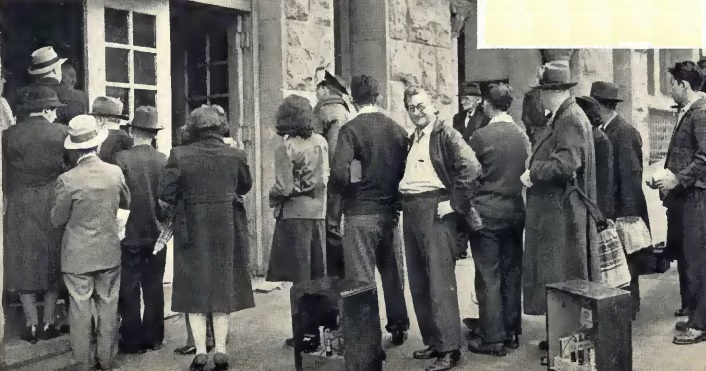Shown here, in the January 1942 issue of Radio Retailing magazine, are resident aliens in Los Angeles lining up at a police station to turn in their cameras, guns, and radios capable of receiving short wave.
The magazine noted that Attorney General Francis Biddle had issued an order that enemy aliens, that is, citizens of Japan, Germany, and Italy, turn these items in to the nearest police station. An alternative would be to have receiver rendered incapable of receiving signals other than those in the standard broadcast band. Therefore, the order “seems to open the way for radio servicemen to render a useful service of eliminating shortwave reception from aliens’ sets–and get paid for it. In this way, the alien may keep his set for regular broadcast listening to U.S. stations, while the police authorities are spared the storage of hundereds of radio sets which they are poorly equipped to handle. And the radio man collects $1 to $2 per radio set altered.
Typically, the modification consisted of removing the shortwave coils, and providing the set’s owner with an affidavit documenting the modification.
75 years ago today, the Chicago Tribune, January 6, 1942, carried an article regarding the status of the order. It reported that local officials found the response so far to be unsatisfactory, since fewer than 2550 cameras, guns, and radios had been surrendered as of the previous night, despite an alien enemy population of more than 50,000 (28,000 Germans, 21,000 Italians, and 250 Japanese).
The Chicago police reported that the items surrendered included several antiques, including an 1878 breach loader. One man was reported to have “embarrassedly handing over a sawed off shotgun, possession of which had been taboo in Chicago ever since the prohibition gang war era. He said that he inherited the weapon from his father.”
One man, not bothering to wait for a receipt, simply drove up to the police station, hurried a radio from his car, and drove away. Another motorist tossed a $100 radio from his car and drove off.
The paper also reported a supplemental order from the Attorney General listing the following prohibited items:
Weapons or implements of war or component parts thereof; ammunition of all kinds; bombs; explosives or material used in the manufacture of explosives; signal devices; codes or ciphers: papers, documents, or books In which there may be invisible writing; photographs, sketches, pictures, drawings, maps, or graphical representation of any military or naval installations or equipment of any army, ammunitions, implements of. device or thing used or intended to be used in the combat equipment of the land or naval forces of the United States or of any military or naval post, camp, or station.


My grandfather lived in RI where I also live. He emigrated here from Italy.
He had a black dial Zenith console radio. I would play with it when I was young since our family lived with him since 1955. The radio would not receive shortwave. My mom told me that this was because during the war the radio was disabled. I have no idea as to whether or not anyone ever offered to fix the radio after the war.
While the war was going on my mom’s fiancée, my future father, was fighting in Germany.
It should also be noted that my grandfather took citizenship classes and became a full US citizen. I am pretty sure he received his citizenship papers before the war. I will have to check with my mom (presently 93 years old) to be sure.
It was in my opinion a bad policy just as was the internment of Japanese citizens. I hope that we learned a lesson and never do this to other people such as recent immigrants from the Middle East.
Thanks for sharing!
I’ve never heard of anyone getting back their radio/camera/gun at the end of the war. In theory, the item was safely stored away in the police station (or in your grandfather’s case, the shortwave coils were theoretically stored by the serviceman who removed them). But I’ve never heard of anyone who went back four years later to retrieve their property.